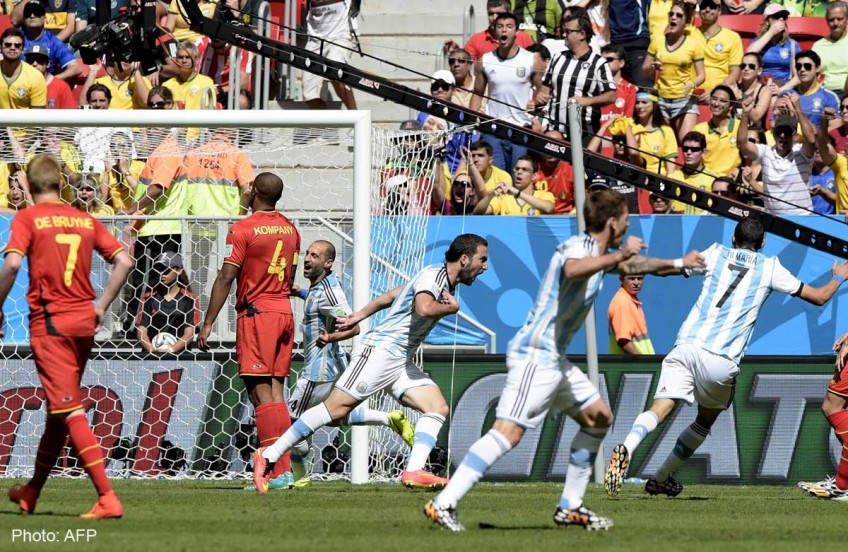Higuan's early strike decides


Like their hated rivals Brazil, Argentina have made it to the final four of the World Cup without ever playing really well for an entire game.
Unlike their hated rivals, however, their talisman is still intact.
Lionel Messi turned provider and creator at the Estadio Nacional de Brasilia and survived the encounter without incurring injury.
Argentina are still not playing at the level you might expect but, at this stage of the tournament, it matters little.
Belgium were put down by an early Gonzalo Higuain strike and kept there by a combination of tough tackling, good marking and Belgium's own failings.
This was by no means a classic game.
After a disappointing performance against Switzerland, Alejandro Sabella rang the changes.
Martin Demichelis came in for Federico Fernandez at the back, Jose Maria Basanta for the suspended Marcos Rojo on the left and Lucas Biglia for Fernando Gago in the middle.
Marc Wilmots made only one alteration, bringing in Kevin Mirallas for Dries Mertens.
In retrospect, he should have made more.
Argentina's problem this summer has been a predictable over-reliance on Messi.
SUPERSTAR
Even the most unprepared teams know that Sabella's players will try and get the ball to their superstar colleague as quickly as possible and as often as possible.
Now the plan had changed a little.
Messi dropped deeper and instead of being the man designated to finish attacking moves, he was directed to start them. The move paid instant dividends.
Javier Mascherano, excellent throughout, won the ball and slipped it to Messi. Despite the overbearing presence of Axel Witsel and Marouane Fellaini, the little Barcelona player bobbed and weaved, ebbed and flowed and released Angel di Maria.
Di Maria's through-ball caught a wicked deflection off Jan Vertonghen, zipped towards Higuain and the Napoli man gave it a wallop as it went past.
Thibaut Courtois had no chance.
Di Maria, who endured an horrendous afternoon against the Swiss in the last round, was much improved, but his game ended prematurely when he appeared to suffer a thigh injury.
He watched the rest of the match from the bench with an ice pack on his leg.
The lead could have been increased shortly before half-time when Messi, again causing problems, was felled on the edge of the box. Fellaini, so frustrated, must have fouled him four times before he finally crashed to earth.
A goal would have been adequate compensation for the bruised legs, but Messi's shot just rose over the bar.
Another could have followed shortly after the break.
Higuain, rejuvenated by his goal, burst through the Belgian lines, leaving Vincent Kompany behind him only to crash his shot off the crossbar.
That was enough for Wilmots.
On came Romelu Lukaku and Mertens, replacing Divock Origi and Mirallas.
Belgium changed to a 4-4-2 formation with out-and-out wingers firing in crosses for old-fashioned target men.
But they couldn't make an encouraging spell of possession count.
Excellent against the United States in the week, this was a return to the turgid football of the group stages.
Eden Hazard, not for the first time in this tournament, was a key offender.
This is not to say that Argentina were fortunate to progress. Sabella's team were relentless in their defence, shutting down the Belgians wherever they appeared.
Mascherano covered so much grass that he was his own defensive midfield partnership.
Like Brazil, the feeling lingers that Argentina are less than the sum of their parts and sustained by hard work and determination.
But you will struggle to find an Argentine supporter who cares. They ride to the semi-finals.
And Messi rides with them.

This article was first published on July 6, 2014.
Get The New Paper for more stories.